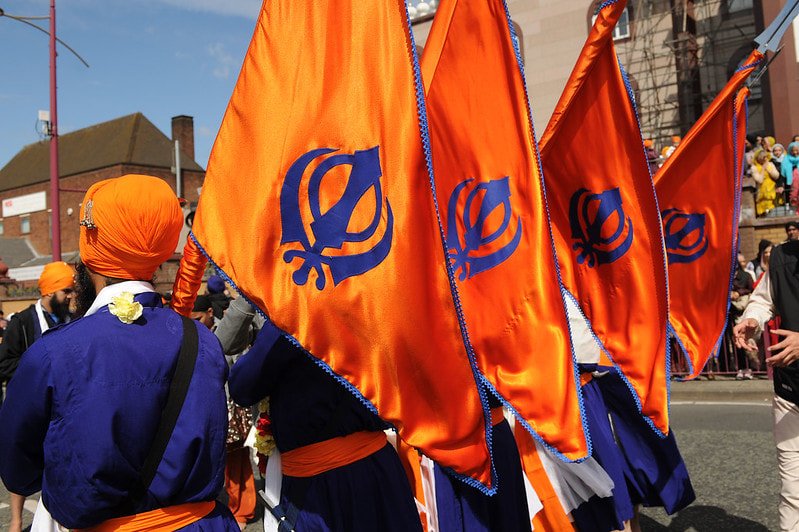
CELEBRATING SIKH HOLIDAYS
January 5
Gurpurab of Guru Gobind Singh
Birthday of Guru Gobind Singh, the 10th guru
March (date varies)
Hola Mohalla
A festival including parades, displays of martial arts skills, and celebration of community.
Falls around the same time as the Hindu festival of Holi, but is a unique celebration.
April 13 or 14
Vaisakhi
Commemorates the formation of the Khalsa and celebrates the Spring harvest.
The most significant annual Sikh holiday.
October/November (date varies)
Bandhi Chhor Divas
Celebrates the safe release of Guru Hargobind (6th guru) and 52 kings from Gwalior Prison, where they were being held by the Mughals.
Falls around the same time as Diwali, which is celebrated across South Asia.
November (date varies)
Gurpurab of Guru Nanak
Birthday of the first guru, Guru Nanak
What is Vaisakhi?
Vaisakhi (va-SAH-khee) commemorates the creation of the Khalsa, the community of initiated Sikhs, and the establishment of many of the defining aspects of Sikh identity, including the names Singh and Kaur and the 5Ks, which include not cutting one’s hair (kes) and wearing a kara (steel bracelet), and kirpan (a small sword or dagger).
Download and share our Vaisakhi and Sikh Heritage Month Flyer
Vaisakhi 2022
What does Vaisakhi mean to me?
April 14, 2023
by Harsirat Kaur
ST. LOUIS- If I have to sum up my faith in one word, it will be “complete.” This is because Sikhism to me means that I get to be who I want to be in the presence of Waheguru. The essence of Sikhi would not be complete without knowing Vaisakhi: the festival of community, service, and harvest.On April 13, 1699; the tenth Guru of Sikhi, Guru Gobind Singh Ji established the Khalsa Panth, also known as the free community. It was the day when years of oppression from Mughals leading up to restoring the essence of togetherness in North India came together in the form of Sikhi. Now Sikhs all over the world eagerly wait for this festival because it reminds them of the identity that they have to uphold, that teaches them to serve others and be true to the soul that resides within.
I became a questioning believer around 2017 because I started diving into questions like how does religion help the world when there are so many evils? The research I did on what Guru Granth Sahib Ji talks about God, the world, free will, karma, virtues, vices, and meditation; and it brought me to the understanding that all that matters in this world is your personal growth. It can be in terms of having a healthy relationship with food, yourself, others, the planet, or God. The holy book of Sikhs emphasizes personal development and getting over egoism to the extent that on p. 258, it is written, “Badheo aapan hau hau banda, dos det agauh kau andha,” literally translates to “The person who has bound himself in his egoism blame others for his bondage.”
Vaisakhi to this end reminds the Sikh community, including me, to get together with other like-minded people. If it is hard for anyone to find the tribe, then to get together with God. Vaisakhi to me means going to the Gurudwara and listening to shabads/hymns and serving others and eating together. It reminds me of equality of all but also how life all boils down to the fact that we are all finding something on Earth, some find “that something” in God, some in other things. But how jaunty it is to see Sikhs find a day to take part in the Nagar Kirtan and help those who are in need! To sum up, Vaisakhi is a reminder to me that years go by and so much changes but during spring, there comes a time when fruits are harvested in accordance to how you sowed them.
Vaisakhi 2022
By Jessi Kaur
Each year during the month of April, Vaisakhi is celebrated by Sikhs all over the world as one of the most significant holidays. Vaisakhi usually falls on April 13th or 14th. In the fifteenth century India, Guru Nanak, the founder of the Sikh tradition, laid down the egalitarian roots of the faith. On Vaisakhi Day in 1699, Guru Gobind Singh, the 10th Sikh Guru (teacher), formalized the faith. Vaisakhi is celebrated as the birth anniversary of the Khalsa, the ones who have achieved a high (pure) consciousness.
Guru Gobind Singh instructed all men to take on the last name of Singh meaning courageous as a lion, and women to take the name Kaur, meaning princess. Having common last names throughout the community signified that all people were equal; no one had a higher social status than anyone else. It was meant to bring down the rigid divides of the caste system that glorified some and marginalized others.
Guru Gobind Singh also mandated the wearing of the five articles of faith which led to the distinct identity that baptized Sikhs continue to maintain. Kes, unshorn hair and a turban to cover the hair, a wooden comb (kanga), a steel bracelet (kara), under shorts (kachera), and a sword (kirpan). These distinctive articles of faith were intended to remind them of their duty to be in constant readiness to serve humanity and protect human rights and liberties. The courage of the Sikhs in the face of existential threat they faced under a tyrannical Mughal regime in the sixteen and seventeen century, and their Chardikala, a spirit of optimism, has become a core Sikh value. This same value comes to mind in the way the Ukrainians are defending their land and people. The fight between evil aggressors and innocent people has continued over the centuries in different lands. It takes a lot of sacrifice, toil, and blood to stand up, gain victory and preserve human rights and liberties of a free people.
As we celebrate Vaisakhi 2022, let’s pray for Chardikala, the spirit of optimism and world peace to prevail. May the festivities, celebrations, and parades held in gurdwaras all over the world remind us that the birth of the Khalsa was a groundswell day that marked preservation of dignity, equality, and liberty for all.
Celebrating Vaisakhi 2020, a Reflection
Vaisakhi 2020, in the era of Covid-19
This Vaisakhi, let us transition from a mindset of fear/anxiety, through a mindset of learning, to a mindset of growth and eternal optimism- Chardi Kala!! What are Sikh Youth doing to be in Chardi Kala? What tools have the Gurus given us? Let us hear from Sufi Kaur, a young Sikh from California.
This Vaisakhi, what will you do to be in Chardi Kala?
For Parents
As a parent, it can be overwhelming and intimidating to talk about our important celebrations with others, especially when we are approaching teachers or school administrators. We at Kaur Foundation understand and have created this helpful guide to assist you in this endeavor.
If ever you need any further resources, please reach out to us at info@kaurfoundation.org





